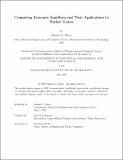| dc.contributor.advisor | Townsend, Robert | |
| dc.contributor.author | Bruce, Samuel G. | |
| dc.date.accessioned | 2025-08-27T14:32:30Z | |
| dc.date.available | 2025-08-27T14:32:30Z | |
| dc.date.issued | 2025-05 | |
| dc.date.submitted | 2025-06-23T14:01:02.311Z | |
| dc.identifier.uri | https://hdl.handle.net/1721.1/162547 | |
| dc.description.abstract | The emergence of new technologies such as e-payments and tokenized assets, distributed ledgers, smart contracts and encryption have created new opportunities for improving access and equity in financial institutions. These new tools can be used to build better infrastructure and improve economic efficiency, especially in previously underdeveloped countries. The use of these tools in various applications however requires and intimate link between economics and computer science to ensure an implementation that is both computationally efficient and improves social welfare. There has been significant research in the field of computer science concerning the computation of economic equilibria, specifically Nash Equilibria and Correlated Equilibria. These algorithms, however, have not been used in many financial applications. Further, while research exists on various methods of computation for Correlated Equilibria, little exploration has been done evaluating the quality of these equilibria in terms of economic efficiency in specific mechanisms. This work provides a sweeping view of the existing literature on equilibrium computation as well as an analysis on the economic and algorithmic tradeoffs of different approaches. The discussion begins with simple 2-player, finite action games, then moves to more complex machine learning based method for equilibrium computation in difficult settings. One of these methods is then extended to a limit-order market game explicitly described by Dubey [1] and implemented, with small modifications, by SPEEDEX [2]. This limit-order game offers a continuous, vector-valued action space with complex payoff functions, causing tension with many of the equilibrium computation algorithms explored previously. This paper identifies these tensions, then offers modifications to algorithms which allow tractable, welfare improving approximate Coarse Correlated Equilibrium computation. Finally, there is a discussion on future work which aims to generalize the developed framework. The code corresponding to the equilibria computation will be released publicly in this repository [3]. | |
| dc.publisher | Massachusetts Institute of Technology | |
| dc.rights | In Copyright - Educational Use Permitted | |
| dc.rights | Copyright retained by author(s) | |
| dc.rights.uri | https://rightsstatements.org/page/InC-EDU/1.0/ | |
| dc.title | Computing Economic Equilibria and Their Applications to
Market Games | |
| dc.type | Thesis | |
| dc.description.degree | M.Eng. | |
| dc.contributor.department | Massachusetts Institute of Technology. Department of Electrical Engineering and Computer Science | |
| mit.thesis.degree | Master | |
| thesis.degree.name | Master of Engineering in Electrical Engineering and Computer Science | |
